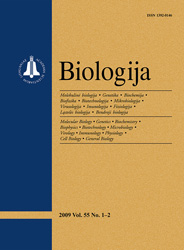 ISSN 1392-0146 ISSN 2029-0578 (online) |
2009 m. Nr. 1-2 Influence of cadmium, zinc and selenite ions on protein synthesis in mouse liver
The study aimed at evaluating short-term (24 h) in vivo effects of cadmium (Cd2+), zinc (Zn2+), and selenite ions (SeO32–) on translational machinery in mouse liver. Activities of translation, tRNALeu and leucyl-tRNA synthetase (LRSase) were analysed by incorporations of [14C]-labeled leucine ([14C]-Leu) into specific products using liver preparations from mice after intraperitoneal (i.p.) injection of single doses of the following salts solutions: (1) CdCl2 (1.6 mg Cd per 1 kg of body mass); (2) ZnSO4 (3.1 mg Zn per 1 kg of body mass); (3) Zn-SO4 and after 20 min CdCl2 (amounts of respective elements indicated above); (4) Na2SeO3 (1.25 mg Se per 1 kg of body mass); (5) Na2SeO3 and after 20 min CdCl2 (amounts of respective elements indicated before). In respect to control, time-dependent biphasic response of translation in the liver was determined following mice i.p. treatment with CdCl2: diminution by 38% at 2 h followed by a 51% increase at 8 h and by a 32% decrease at 24 h. Neither Zn2+ nor SeO32– caused remarkable alterations of translation activity when liver had been exposed to those ions for 2 h and 24 h. As compared to the control, Zn2+ and SeO32– activated translation in mice liver by 67% and by 26% respectively in the 8-h period of exposure. Pretreatment with Zn2+ favoured the resistance of the translation system to Cd2+ only at 2 h, while pre-treatment with SeO32 favoured such a resistance at 2 h and at 24 h of Cd intoxication. The acceptor activity of tRNALeu decreased by 44–74% and the activity of LRSase by 20–30% within a 24-h period following i.p. injection of CdCl2. An exposure time-dependent decrease of tRNALeu acceptor activity versus an exposure time-dependent increase of LRSase activity were observed in the preparations from ZnSO4-injected mouse liver. Mice pre-treatment with ZnSO4 prevented activity of LRSase within 24 h against Cd-induced inhibition, but failed in the protection of the acceptor activity of tRNALeu. Responses of those translational components to SeO32– were converse and biphasic: the maximum decreasing tRNALeu acceptor activity (by 66%) a with a simultaneous and insignificant increase of LRSase activity (by 12%), observed after 8 h, were followed by re-activation of tRNA and an insignificant decrease of LRSase activity after 24 h of liver exposure to Na2SeO3. In liver preparations from SeO32– and Cd2+ co-treated mice, Cd inhibitory effects on tRNALeu were almost abolished within a 24-h period, whilst these effects manifested on LRSase at 2 h and were partly relieved at 8 and 24 h following the treatment. Keywords: cadmium, zinc, selenium, translation, tRNA, leucyl-tRNA synthetase |
Issues:
2011 - Vol.57 No. 1, No. 2, No. 3 2010 - Vol.56 No. 1-4 2009 - Vol.55 No. 1-2, No. 3-4 2008 - Vol.54 No. 1, No. 2, No. 3, No. 4 2007 - Vol.53 No. 1, No. 2, No. 3, No. 4 2006 No. 1, No. 2, No. 3, No. 4 2005 No. 1, No. 2, No. 3, No. 4 2004 No. 1, No. 2, No. 3, No. 4 2003 No. 1, No. 2, No. 3, No. 4 2002 No. 1, No. 2, No. 3, No. 4 2001 No. 1, No. 2, No. 3, No. 4 |